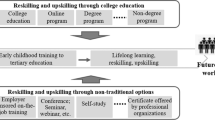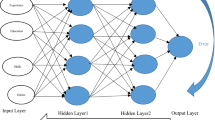Abstract
Obtaining meaningful, fulfilling employment is important to the enhanced quality of life of all people. Unfortunately, data show that people with disabilities, in general, achieve much poorer employment outcomes than do people without disabilities, and that people with intellectual disability have even less positive employment outcomes. There are many reasons for this, but at least one factor may be limitations to the ways of determining the job and vocational interests and work preferences of people with intellectual disability. This study examined the use of a cognitively accessible, iPad-based app that provided multiple opportunities for people with intellectual disability to view videos about potential work contexts and job tasks and to identify preferred work options. Participants in this study were able to use the app with minimal prompting and were able to identify job and work interests and preferences that matched those identified for them by vocational counselors.


Similar content being viewed by others
References
Bureau of Labor Statistics (2015). Disability employment statistics. Accessed 18 Feb 2018 from http://www.dol.gov/odep/topics/DisabilityEmploymentStatistics.htm.
Cornell University (2012). 2012 disability status report: United States. Accessed 17 Feb 2018 from http://disabilitystatistics.org/reports/2012/English/HTML/report2012.cfm.
Lee, Y., Wehmeyer, M., Palmer, S., Williams-Diehm, K., Davies, D., & Stock, S. (2011). The effect of student-directed transition planning using a computer-based reading support program on the self-determination of students with disabilities. Journal of Special Education, 45, 104–117.
Parsons, M. B., Reid, D. H., & Green, C. W. (2001). Situational assessment of task preferences among adults with multiple severe disabilities in supported work. Journal of the Association for Personals with Severe Handicaps, 26, 50–55.
Shogren, K. A., Wehmeyer, M. L., Palmer, S. B., Rifenbark, G., & Little, T. (2015). Relationships between self-determination and postschool outcomes for youth with disabilities. Journal of Special Education, 48(4), 256–267.
Stock, S. E., Davies, D. K., Secor, R. R., & Wehmeyer, M. L. (2003). Self-directed career preference selection for individuals with intellectual disabilities: using computer technology to enhance self-determination. Journal of Vocational Rehabilitation, 19, 95–103.
The Arc of the United States (2011). Still in the shadows with their future uncertain: a report on Family and Individual Needs for Disability Supports (FINDS), 2011. Washington DC: Author.
Wehman, P. (1992). Life beyond the classroom: transition strategies for young people with disabilities. P.H. Brookes Pub. Co.
Wehmeyer, M. L., & Metzler, C. A. (1995). How self-determined are people with intellectual disabilities? The National Consumer Survey. Mental Retardation, 33, 111–119.
Wehmeyer, M. L., Palmer, S., Shogren, K., Williams-Diehm, K., & Soukup, J. (2012). Establishing a causal relationship between interventions to promote self-determination and enhanced student self-determination. Journal of Special Education, 46, 195–210.
Author information
Authors and Affiliations
Contributions
DKD and SES: designed and executed the study, assisted with the data analyses, and assisted with writing the paper. CDD: assisted with the data collection and software development. MLW: consulted on research design and assisted with writing the paper.
Corresponding author
Ethics declarations
Conflict of Interest
The authors declare that they have no conflict of interest.
Ethical Approval
All procedures performed in studies involving human participants were in accordance with the ethical standards of the institutional and/or national research committee and with the 1964 Helsinki declaration and its later amendments or comparable ethical standards.
Informed Consent
Informed consent was obtained from all individual participants included in the study.
Rights and permissions
About this article
Cite this article
Davies, D.K., Stock, S.E., Davies, C.D. et al. A Cloud-Supported App for Providing Self-Directed, Localized Job Interest Assessment and Analysis for People with Intellectual Disability. Adv Neurodev Disord 2, 199–205 (2018). https://doi.org/10.1007/s41252-018-0062-8
Published:
Issue Date:
DOI: https://doi.org/10.1007/s41252-018-0062-8




